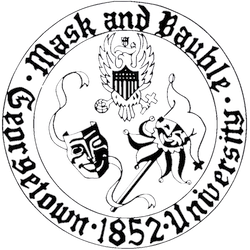How I Got There: Stage Management | Michael Donnay (COL ‘16)

Posted in Student & Alumni Stories | Tagged Creative Fields
Michael Donnay studied History in the Georgetown College and is now a freelance stage manager. Learn how Georgetown shaped his path, what led him to his current position, and more insights regarding skills and the broader performing arts industry:
What activities at Georgetown did you find the most valuable?

While at Georgetown, I was an active member of the student theatre community. I worked in a range of production roles on shows with the Theatre & Performance Studies Program and the theatre clubs. During my senior year, I served as the Executive Producer of the Mask & Bauble Dramatic Society. My experience with student theatre was incredibly valuable because of the hands-on learning I was able to do each day. The productions were largely student-driven, so if I wanted to achieve a particular result I had to figure out how to learn the skills I needed. I had incredible faculty and student mentors, but I also had the opportunity to do a lot of self-directed development.
How did you find your current position?
With the average theatre contract lasting 2-3 months, I am always looking for my next position. Almost every job I’ve gotten since graduation has come through a personal connection I made during an apprenticeship program I did at the Actors Theatre of Louisville. While there, I had the opportunity to work with a range of professional stage managers and directors, some of whom have since offered me to work with them.

I also developed close relationships with fellow apprentices, who have brought me into the theatres they have worked at since completing the apprenticeship. The theatre industry is built on personal connections and especially for roles in the rehearsal process like stage managers, directors, and actors––where the way you carry yourself is almost as important as the quality of the work you produce––it’s rare to get a job based on an application alone.
What does a typical week look like for you?
As a stage manager, my role on the production team is to facilitate the rehearsal process of a specific show; I am successful when everyone else is able to do their best work. I coordinate communication between the actors and director in the rehearsal room and the design teams working on the technical elements of the show. I create the rehearsal schedule and help ensure that the theatre is following the guidelines from Actor’s Equity, the union of actors and stage managers in the U.S.
When we get into performances, I facilitate the integration of the technical elements into the show. This can include supervising the backstage crew, making sure the sound and light cues happen at the correct time, and creating the schedule for technical rehearsals. I sometimes get to do some really fun things when running a show; during a production of A Christmas Carol I got to operate a 20-foot puppet of the Ghost of Christmas Future.
The theatre industry is built on personal connections and especially for roles in the rehearsal process like stage managers, directors, and actors––where the way you carry yourself is almost as important as the quality of the work you produce––it’s rare to get a job based on an application alone.
What skills are most needed in your role?

Stage management requires a combination of interpersonal and organizational skills. Much of my day-to-day work involves managing expectations and keeping the tone of the rehearsal room productive. I have to learn how what each director and actor needs to be successful; being adaptable is key. Since the stage manager is responsible for tracking all of the decisions made in rehearsal and communicating them to the design team, attention to detail and an ability to multitask is key. I am often updating paperwork, following along in the script, and answering emails at the same time. A sense of humor helps immensely as well.
If you could go back and change one thing, what would that be?
I definitely would have taken greater advantage of internship opportunities in DC during the school year. I only looked for internships during the summer and missed out on a number of great opportunities that theatres in the local area offered during the academic year. Because of this, I walked into the professional world with half of the experience of some of my colleagues.
Interested in hearing more stories? Check out the rest of our How I Got There series.
